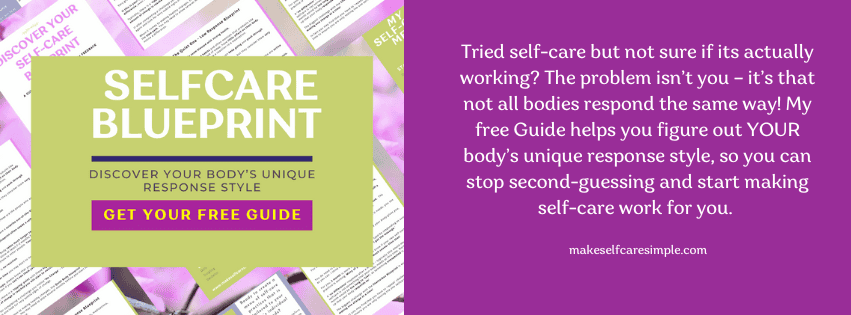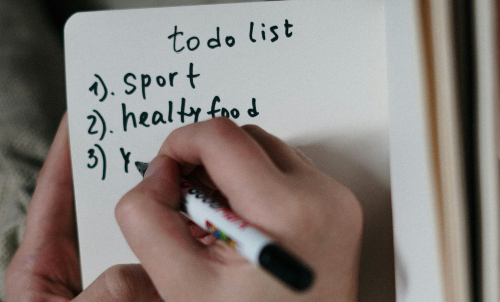There are literally hundreds of self-care practices you could start tomorrow, but how do you decide which ones are worth spending your time doing?
When you decide to invest precious time, energy and money on your well-being, especially when you are coping with ongoing health conditions, it is worth spending a couple of minutes answering a few questions before you decide if this new self-care is worth exploring.
In the last decade the internet has been buzzing with thousands of healthy choices, ideas and opinions that promise to transform your health.
This has become a vast resource that is often freely available to everyone who is seeking answers and options.
On the other hand too much choice can become overwhelming, especially when supporting your health has become an essential factor in your life.
My aim with this blog is to make selfcare simple and help you find the self care practice that gets you results.
To get started I have put together 7 questions to ask before starting a new self care practice.
I have used both my experiences as a natural health practitioner and personal health journey to help explain how to use each question.
Short on time?
If you just want to skip straight to the questions click to the summary at the end.
Benefit of a Clear Strategy
My own self-care practice has changed over the years, depending on what was happening in my life and health journey, and the results I achieved was down to always having a clear strategy behind each self care practice I included.
In other words, I always know exactly what result I expect to experience from any self-care choices I made.
In my Natural health clinic, I helped hundreds of clients over many years to create individualised self-care practices.
In this article I want to help you get started, by sharing questions to ask before starting a new self-care practice.
What is the definition of Self-Care?
Who defines self-care as:
“Self-care is the ability of individuals, families and communities to promote and maintain their own health, prevent disease, and to cope with illness – with or without the support of a health or care worker.”
My aim with any self-care practice is to provide one of the following:
- Improve my current health levels
- Maintain good health levels
- Prevent future health issues
- Better cope and manage existing illness.
A self care practice goes a little deeper than a healthy lifestyle, it is specifically fine tuned to the needs of your individual body and health needs.
Lets dive into the 7 questions to ask before starting a new self-care practice.
1. What benefit can I expect to experience or see?
This is the important question. Will following this self-care practice benefit and improve your individual health levels?
It might sound obvious but in the clinic I had clients spending time and money on popular health practices and products that they did not need. And because their body did not need it, they never experienced the same results as other people.
Which can leave you feeling frustrated and wondering ‘what is wrong with me?’ or ‘what am I doing wrong?’ or that it doesn’t work and was a waste of time.
Seeing someone else getting results is a very powerful motivation especially when you are struggling.
‘It worked for me, so I’m sure it will help you too’.
Is a well-meaning phrase, but often a bit of a red herring when it comes to self-care.
The reason why there are so many solutions and none of them work 100% for every person is because you are not an exact copy of everyone else – you and your body are unique and individual and so are your health needs.
Knowing what support your body most needs right now is an important guide to which self-care practices to consider.
If you don’t know – that should be your first self care practice – to understand your health condition better.
Start with simple basics and know that as you learn more about your health conditions your self care practice will become more individual and tailored to you..
For instance, a mindfulness practice to help soothe anxiety would not be the most important part of my own self-care, as I am quite relaxed and calm naturally. It’s possible I would not notice any positive changes to my health levels.
But for someone who suffers with anxiety the benefits become much more valuable and they are likely to notice and experience incredible improvements.
Check what benefits to expect with each self-care practice you consider. Then decide if you, your body and health situation need them.

2. How soon before I can expect to feel/notice the benefits?
Some self-care practices feel good as soon as you do them, but the benefits only last a short while. Others take longer to build up and change the body, so it may take longer to experience the results.
Admittedly this question has many variables, mainly because each person is unique. You may not be able to answer this question exactly until after a bit of trial and error.
The reason why I like to have a rough idea of how soon to expect results is so I can monitor which practices are working well and which ones I need to swap out.
My goal is always to get the best health benefits, in the shortest, easiest and most enjoyable ways possible.
Life is far too short to be spending 15 minutes every single day on a self-care practice that makes very little difference to my well-being. Or spending £10 a week on a product that does nothing to reduce a symptom.
In one year that would mean 5475 minutes or 91 hours or £520 of wasted time and money!
As a rule of thumb if I don’t notice a difference after 1 month, I consider stopping that practice.
I can say this confidently because I know which Self-Care Blueprint I have.

To answer this question you also need to be realistic.
No selfcare practice will give results unless you are consistent.
Do not expect a complete recovery in 1 week or month, the aim is to notice small improvements and changes.
It is super helpful and motivating to know exactly what benefits I receive from each self-care practice I follow.
For instance, after completing just one 10–15-minute Qi Gong practice, I know that I will feel immediate improvements to my stiff and painful neck, a general ease of movement and serenity in my mood.
Consistent practice not only improves my body, mobility and mood, but I also experience the electromagnetic fields and vibrational frequencies of Qi Gong.
And I also know (from experience!) that after 3 days of missing that daily practice my neck will slowly seize up. More than a week of missed practice results in increased aches and pains all over my body. Ouch!
On the other hand, the green supplement powder I use has a more subtle benefit. Over the years I have stopped it and found that at about 6 weeks I noticed a definite dip in my energy levels that I can only regain through my green powder.
Many self-care practices build up slowly over regular use.
I hope my personal examples show how helpful it is to understand the timing factors for each self-care practice you follow.

3. How much time will this take to do each day/week?
Currently I work full-time, blog on the side and follow a daily self-care practice morning and evening. I also have a daughter, dog, home & garden, and family member commitments…I am busy!
Time is extremely valuable to me.
If there are two practices that offer the same benefits, but one can be done in 5 minutes while the other one requires 50 minutes, I take the 5 minutes every time.
No matter how great the longer practice is, it won’t help me if I never have time to do the practice!
Knowing how much time a practice requires, is one easy way I decide which practices to include and which to leave.
Another question I often ask is ‘can I get enough benefits in less time?’
Of course sometimes that 50-minute practice really is the best option, and acknowledging this first will help you make the time.How important is time for you?

4. How much preparation or planning is involved?
Following certain diets and recipes that support my health often require hours of prep and planning.
I class healthy eating as self-care. For me it is a priority, so I factor in the extra time it takes to prepare my meals in my selfcare planner.
Because I have (currently undiagnosed) MCAS symptoms and can experience extreme reactions to foods, I often don’t have a choice, so I research and explore all the prep and planning hacks and adapt them to suit my needs.
Honestly this has taken me hours and hours.
As a general rule my goal is always to get the best health benefits, in the shortest, easiest and most enjoyable ways possible.
But for my personal health issue, weekly hours spent on meal prep is essential, even if I don’t always enjoy it.
You might come across a self-care practice with lots of benefits that requires a fair amount of prep or planning.
Do the benefits justify any additional preparation and planning of a self-care practice?
Another example would be a gym membership. There is no doubt that there are many benefits to a regular gym work-out, but many people struggle with fitting in the extra time requirements involved in travelling to and from the gym in their busy lives.
If the thought of all that additional time spent on prep and planning gives you that sinking feeling that could be a sign that for now you need self care that is simple and easy.
5. What additional costs are involved?
Most self-care practices require some kind of cost. Especially when you first start and are getting set up.
I am quite frugal by nature and circumstance so it’s important to me that I am getting good value for any costs.
I have found that many of the very best self-care results cost next to nothing!
Sometimes an additional cost is worth it.
A higher cost should save you:
- Time,
- Provide better user quality,
- Results you can’t receive from other options.
The good news is that if you are prepared to allocate more time and effort a great deal of self care is affordable. Check out my self care challenges for ideas!
6. How much effort is required?
For those of us suffering with low energy and fatigue asking how much effort is required can feel like a daily mantra!
This is when it helps to get honest about your energy levels, brain fog and motivation.
Every self care practice will involve some level of effort, simply because any change to your routine requires effort in the beginning.
If the effort required leaves you feeling drained, that is a potential red flag.
If you find yourself ‘avoiding’ or ‘forgetting’ it can be helpful to do some further self-enquiry as to what is really happening.
Often the first week of a practice feels easy because we are motivated, but by the next week it can start to feel like hard work!
Having to turn out and drive to an evening yoga class may feel like too much effort for one person while another will make time to experience the amazing instructor and group energy.
Once you accept that any new self care practice is going to take a certain amount of effort, you just need to ask…
Is the effort worth the value you would receive?
7. Do I enjoy the practice?
I’ve saved this question until last even though I know it is possibly the first one you might ask!
When you find a self-care practice that you enjoy, and which provides the lasting benefits your body needs you have found healing heaven.
Sometimes when something starts to feel easier it becomes more enjoyable. Take yoga or meditation. Typically, these are not easy or enjoyable at the beginning. But after regular practice you become a raving fan!
There is also a place for self-care that provides enjoyment as the main benefit – good to know right? I always try to include these in my day!
Then there are ways you can make a self-care practice more enjoyable.
Perhaps you can turn down the intensity, shorter the duration.
The benefits may take longer but if you enjoy the practice more you will keep going.
Final Summary
So that completes my 7 Questions to ask before starting a new self-care practice. You can use these to help you choose your next self care challenge.
It is my hope that these questions will help reduce any confusion and overwhelm when faced with so many different options.
In summary:
7 Questions to ask before starting a new self care practice.
- What is the benefit I can expect to experience or see?
- How soon before I can expect to feel/notice the benefits?
- How much time will this take to do each day/week?
- How much preparation or planning is involved?
- What additional costs are involved?
- How much effort is required?
- Do I enjoy the practice?
Hope you can join me as I have a LOT more support to offer around self-care!



